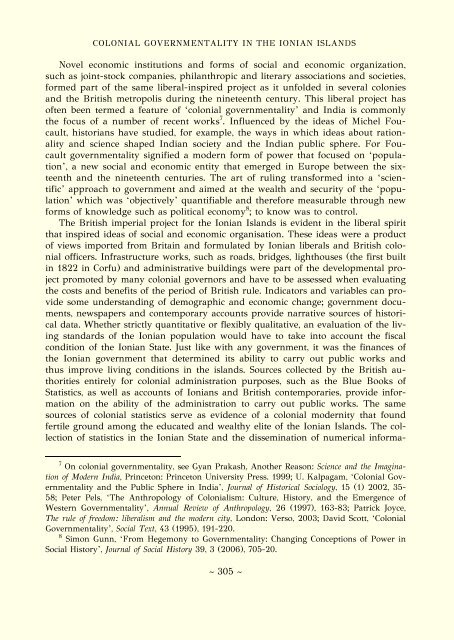You also want an ePaper? Increase the reach of your titles
YUMPU automatically turns print PDFs into web optimized ePapers that Google loves.
COLONIAL GOVERNMENTALITY IN THE IONIAN ISLANDS<br />
Novel economic institutions and forms of social and economic organization,<br />
such as joint-stock companies, philanthropic and literary associations and societies,<br />
formed part of the same liberal-inspired project as it unfolded in several colonies<br />
and the British metropolis during the nineteenth century. This liberal project has<br />
often been termed a feature of ‘colonial governmentality’ and India is commonly<br />
the focus of a number of recent works 7 . Influenced by the ideas of Michel Foucault,<br />
historians have studied, for example, the ways in which ideas about rationality<br />
and science shaped Indian society and the Indian public sphere. For Foucault<br />
governmentality signified a modern form of power that focused on ‘population’,<br />
a new social and economic entity that emerged in Europe between the sixteenth<br />
and the nineteenth centuries. The art of ruling transformed into a ‘scientific’<br />
approach to government and aimed at the wealth and security of the ‘population’<br />
which was ‘objectively’ quantifiable and therefore measurable through new<br />
forms of knowledge such as political economy 8 ; to know was to control.<br />
The British imperial project for the Ionian Islands is evident in the liberal spirit<br />
that inspired ideas of social and economic organisation. These ideas were a product<br />
of views imported from Britain and formulated by Ionian liberals and British colonial<br />
officers. Infrastructure works, such as roads, bridges, lighthouses (the first built<br />
in 1822 in Corfu) and administrative buildings were part of the developmental project<br />
promoted by many colonial governors and have to be assessed when evaluating<br />
the costs and benefits of the period of British rule. Indicators and variables can provide<br />
some understanding of demographic and economic change; government documents,<br />
newspapers and contemporary accounts provide narrative sources of historical<br />
data. Whether strictly quantitative or flexibly qualitative, an evaluation of the living<br />
standards of the Ionian population would have to take into account the fiscal<br />
condition of the Ionian State. Just like with any government, it was the finances of<br />
the Ionian government that determined its ability to carry out public works and<br />
thus improve living conditions in the islands. Sources collected by the British authorities<br />
entirely for colonial administration purposes, such as the Blue Books of<br />
Statistics, as well as accounts of Ionians and British contemporaries, provide information<br />
on the ability of the administration to carry out public works. The same<br />
sources of colonial statistics serve as evidence of a colonial modernity that found<br />
fertile ground among the educated and wealthy elite of the Ionian Islands. The collection<br />
of statistics in the Ionian State and the dissemination of numerical informa-<br />
7 On colonial governmentality, see Gyan Prakash, Another Reason: Science and the Imagination<br />
of Modern India, Princeton: Princeton University Press. 1999; U. Kalpagam, ‘Colonial Governmentality<br />
and the Public Sphere in India’, Journal of Historical Sociology, 15 (1) 2002, 35-<br />
58; Peter Pels, ‘The Anthropology of Colonialism: Culture, History, and the Emergence of<br />
Western Governmentality’, Annual Review of Anthropology, 26 (1997), 163-83; Patrick Joyce,<br />
The rule of freedom: liberalism and the modern city, London: Verso, 2003; David Scott, ‘Colonial<br />
Governmentality’, Social Text, 43 (1995), 191-220.<br />
8 Simon Gunn, ‘From Hegemony to Governmentality: Changing Conceptions of Power in<br />
Social History’, Journal of Social History 39, 3 (2006), 705-20.<br />
~ 305 ~



